After receiving a treatment for alcohol at a rehabilitation centre it is of the utmost importance that the individual must try and sustain their recovery in whatever way is most effective and suited to their desires and needs. For some individuals, keeping sober may mean keeping up with their regular medication in order to keep cravings at bay; for others it may mean staying dedicated and motivated through therapy, or keeping openness and communication with friends and family. Or often it will mean keeping all three of the aforementioned things. Nevertheless, for a majority of recovering alcoholics, the most beneficial step in order to keep on the healthy and sober path is to enrol in a group support group, for example Alcoholics Anonymous.
Regardless of the known benefits of continuing to maintain support after the rehabilitation programme. A lot of recovering addicts do not participate in any type of after care. Ultimately this can have a very negative influence on their chances of a successful long term recovery of abstaining from alcohol.
Fear and Doubt
The reason as to why recovering addicts do not enrol on any after care programmes has been a pertinent question asked by many people working with addicts. Researchers have therefore looked explicitly at why people do not attend group therapy, such as AA meetings. Despite having all the information telling them the benefits it will have on their recovery. Many people have great fear or doubt about attending such groups. Many assume that there will be judgement at a local AA meeting. There are therefore manuals which have the intention of helping those who have doubts about attending AA meetings.
These manuals aim to explain and enlighten people about the process of such groups. Further the understanding surrounding them in anticipation that it will make it easier for people to attend for the first time. Showing people that there is nothing to be scared of and that all of those attending are in the same place has proven to be successful at making recovering addicts feeling more at ease at the thought of attending such meetings. Therefore, when an individual actually attends support groups such as AA. They will enter with more ease and be more open to receiving the support available to them.
Recovery – Work the Programme
By discovering the factors that act as barriers, inhibiting people from attending support groups. It makes it possible to discover what the solutions are. Therefore, we can help those struggling to create their own understanding of their path to recovery so that they find it easier and are able to confidently attend group meetings, like AA. Doing this means that they can have a better chance of maintaining their sobriety and long term recovery. This ultimately means, a healthy and happy life. If you or a loved has come out of a rehabilitation programme, attending an aftercare programme, such as AA, is strongly advised.
For more information please see: Kaskutas et al. (2009) Effectiveness of Making Alcoholics Anonymous Easier: A Group Format 12-Step Facilitation Approach. Journal of Substance Abuse Treatment.
If you have an alcohol or drug related problem. Please call 01462 851414 for free and confidential advice and help.

